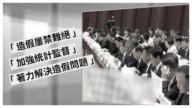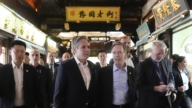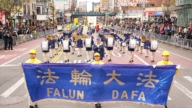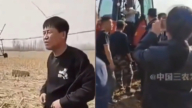【新唐人2012年7月17日訊】中國與鄰國在東海和南海的主權糾紛日趨激烈的同時,日本軍方本年度的《防衞白皮書》也即將出籠。今年的白皮書再次把矛頭對準中國,並拿中共黨與軍隊關係做話題,強調中國日益強盛的軍力將對日本構成威脅,日本應提高戒備。外界認為,王立軍事件導致世界更加謹慎中共的破壞性,各國都在關注中共18大會給全球帶來甚麼影響。
日本今年的白皮書預計要到本月底或下月初才公布,日本《讀賣新聞》日前率先披露部分內容,其中特別談到中共「黨與軍隊」關係,認為中共黨軍關係出現變化,需要特別關注。
報導指稱,中共歷來奉行「黨指揮槍」原則,而近年來軍方勢力抬頭,影響力增大,軍方對外交的「危機管理決策」影響日增,加上國防開支在過去24年間「急劇增加約30倍」,以及軍方研發新戰機及翻新航空母艦,海軍艦艇在日本附近太平洋進進出出等,反映中國軍方正提高遠洋作戰能力,日本應提高戒備。
時事評論員藍述表示,周邊國家擔心在中國目前政局不穩的情況下,中共內部博弈雙方都會討好軍方,滿足好戰「鷹派」的需要,對外發動戰爭,同時轉移內部矛盾。
時事評論員藍述:「這些中國周邊的國家,讓他們所感到焦慮的不是中國也不是中國人,而是中共的這個政治體制,因為這個政治體製造成了深刻的社會矛盾,造成了中國社會的不穩定,這種體制的本身能夠達到18大權力交接的順利進行,有可能把中國這種深刻的矛盾向外輸出,掩蓋目前中國內部的矛盾。」
藍述還表示,國際社會深知中國的軍隊不屬於國家。他說,中共歷次政治鬥爭中,都是誰掌握了軍權,誰就掌握了政權,國際社會對中國的擔憂實際上是因為對中共的恐懼。
藍述:「日本這次最新白皮書的出爐,不僅反映了日本政府和日本的民間,對中共在18大目前所處在高層分崩的這種形勢的關注,也體現了整個國際社會,是否中共高層的分崩會導致中國社會大幅度的社會動盪表示關注,因為眾所周知,中國的軍隊,它是一個黨衛軍。」
藍述說中國的軍方存在三種勢力,一方是太子黨,一方是江澤民一手栽培的腐敗勢力,另一方是要求軍隊國家化的開明派,這三方勢力不分上下,各不相讓。
前幾個月的中共高層博弈中,中共國家主席胡錦濤對政法委和武警部隊進行了大幅度調整,軍隊高層也重新洗牌,軍中頭腦紛紛向胡錦濤表示效忠。
不過《中國事務》雜誌主編伍凡認為,軍中頭腦雖然向胡錦濤表忠心,但並不意味著軍心穩定。
《中國事務》主編伍凡:「但是現在他也不得不忠誠,為甚麼,軍隊靠誰養,要靠財政部撥款,所以他就為了這些錢,他也要裝模作樣,我對你真誠啊,還有,這些軍官提升靠誰提,是靠軍委主席或者大軍區司令,我得靠你提拔我。」
伍凡指出,日本擔心中國變成軍國主義國家,對它進行威脅。
就在中日東海糾紛日趨激化的同時,日本駐華大使丹羽宇一郎日前「被奉召回國」。外界認為,也許是因為他批評東京購買釣魚島,引起日本輿論不滿,當局要「換馬」。但丹羽宇一郎15號在北京機場宣稱,他回國是報告有關釣魚島事件的最新發展,完成報告後會返回北京。但輿論認為,作為外交慣例,大使「臨時回國」常作為對抗措施使用。
報導說,丹羽宇一郎16號返回中國。不過日本外相玄葉光一郎在與丹羽宇一郎會談後說,已再次要求丹羽準確傳達日本的想法,會談中沒有談到是否撤換丹羽。
採訪編輯/劉惠 後製/蕭宇
Japanese Defense White Paper Pays Attention
to China’s Internal Affairs for First Time
While China is going through increasingly fierce disputes
over sovereignty with its neighbors in the East China Sea
and South China Sea, the Japanese military’s Defense
White Paper (White Paper) is due to be released.
The White Paper this year again targets China, discussing
the relationship between the Chinese Communist Party (CCP), and the Chinese military.
It emphasizes that the growing strength of China’s military
constitutes a threat to Japan. Japan should be on alert.
Observers believe the “Wang Lijun Event” has lead to caution
around the world toward the destructive nature of the CCP.
Each country is watching the CCP 18th Congress
and its impact on the world.
Japans’ White Paper will be published
around the end of July or early August.
Japan’s Yomiuri News has revealed some of its contents.
It especially discusses the CCP’s relationship with Chinese
society, and the ongoing changes of that relationship.
The report points out that the CCP has followed
the principle of “CCP Leading the Military.”
Recently, the military has been getting stronger,
with greater impact on foreign policies.
The national defense budget has increased sharply
about thirty times in the past twenty-four years.
In addition, newly developed warships and flight carriers,
as well as with ships cruising in seas close to Japan,
reflect that China’s military is improving it’s naval capacity,
and so Japan should be on heightened alert.
Commentator Lan Shu said that China’s neighboring
countries are worried about China’s political instability.
Each faction in China’s internal struggle
will ask for allegiance from the military.
It will cater for the military’s need in launching
wars, and shifting internal conflicts.
Lan Shu: “These neighboring countries
are not worried about China or Chinese people.
They are concerned about the CCP’s social system.
The CCP system has resulted in profound
social conflicts and instabilities.
In order to ensure power transition in the 18th Congress,
the CCP might export its problems and cover up conflicts.”
Lan Shu also expressed that the international society
is fully aware the CCP military does not belong to China.
He said that during the many CCP political movements,
whoever has the military will take the power.
The concern of the international society
toward China is actually concern over the CCP.
Lan Shu: “The latest White Paper from Japan not only
reflects the attention of the Japanese government
and the Japanese people on the internal CCP conflicts
before the 18th Congress.
It also reflects the attention of the international
towards China’s social instability.
Everyone knows China’s military belongs to the CCP."
Lan Shu said China’s military has three power factions.
It has the 『crown prince’ faction, Jiang Zemin’s faction
and the group asking to nationalize the military.
The three power groups have equal strength,
and none of them will give in to the others.
During the high-level internal conflicts a few months ago,
the CCP’s president Hu Jintao has conducted large-scale
changes to the Committee of Political and Legislative
Committee, as well as the military police.
High-level military officials were also re-arranged.
Military leaders all show loyalty towards Hu Jintao.
However, Wu Fan, the Chief Editor of China Affairs
thinks that
although leaders of the military show loyalty to Hu,
it does not mean they are stable in their attitude.
Wu Fan: “They have to be loyal now. The military
depends on the government, so it has to show loyalty.
Their promotion is also given
by the military committee chairman.”
Wu Fan points out that Japan is worried that China
will turn into a country led by a military power.
Along with disputes over the Eastern China Sea, Japan’s
Ambassador to China, Uichiro Niwa, was also recently called back to Japan.
His criticism over Tokyo’s purchase of Diao Yu Island
caused dissatisfaction among Japanese media.
However, Uichiro Niwa claimed at the Beijing Airport
that his returning to Japan is to report latest developments.
According to media, the sudden calling back
of the ambassador is measured used against resistance.
The report stated that Uichiro Niwa is returning to China
on July 16, but did not mention if he will be replaced.
However, Japan’s foreign minister Kōichirō Gemba,
met with Uichiro Niwa and asked him to accurately convey Japan’s policy.



























